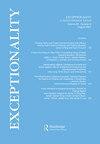Finding a Common Voice: Lessons Learned from a Pilot Mental Health Literacy Intervention for Secondary Students with Disabilities
IF 0.9
4区 教育学
Q4 EDUCATION, SPECIAL
引用次数: 1
Abstract
ABSTRACT The current study evaluates lessons learned from a feasibility and acceptability trial of the Think, Be, Do, curriculum (a mental health literacy curriculum) for transition age students (14–21) in special education classrooms. Six teachers and sixty-two students from a northwest state in suburban and rural settings participated in the intervention group and were exposed to the Think, Be, Do curriculum twice a week for five weeks. Data were collected from students, teachers, and observers. A mixed methods approach captured quantitative and qualitative data from participants. Results from the implementation suggest the curriculum was feasible to implement, acceptable to teachers for their classrooms, and had preliminary increases in student mental health literacy. Lessons learned from the initial implementation and implications for research and practice are discussed.寻找共同的声音:残疾中学生心理健康素养干预试点的经验教训
摘要:本研究评估了在特殊教育课堂上为过渡年龄学生(14-21岁)进行的Think,Be,Do课程(心理健康素养课程)的可行性和可接受性试验所吸取的经验教训。来自西北部郊区和农村地区的六名教师和六十二名学生参加了干预小组,并在五周内每周两次接触“思考、做、做”课程。数据是从学生、教师和观察员那里收集的。混合方法从参与者那里获取了定量和定性数据。实施结果表明,该课程实施可行,教师在课堂上可以接受,学生的心理健康素养也初步提高。讨论了从初步实施中吸取的经验教训以及对研究和实践的影响。
本文章由计算机程序翻译,如有差异,请以英文原文为准。
求助全文
约1分钟内获得全文
求助全文

 求助内容:
求助内容: 应助结果提醒方式:
应助结果提醒方式:


